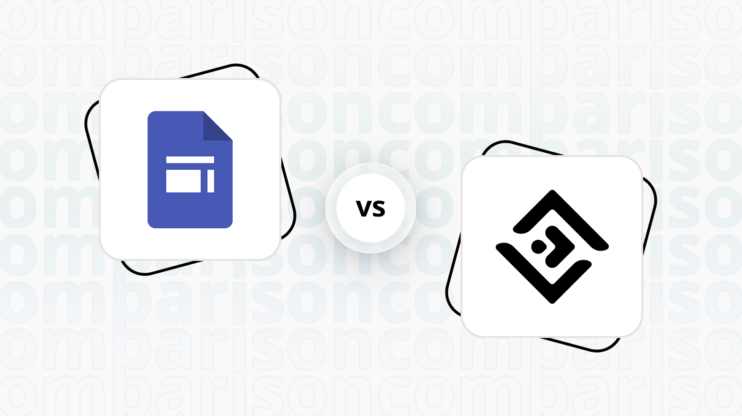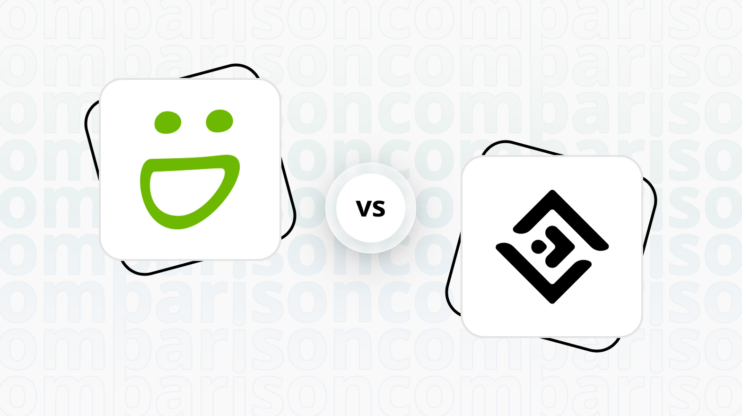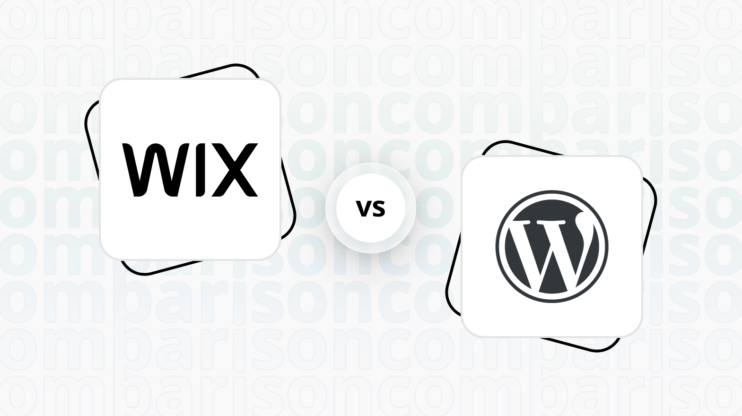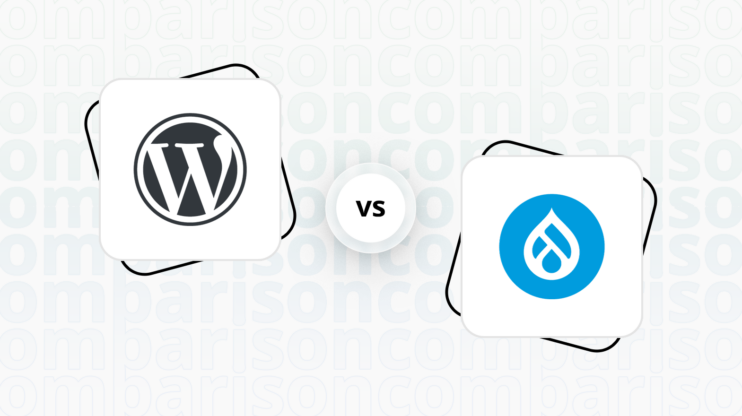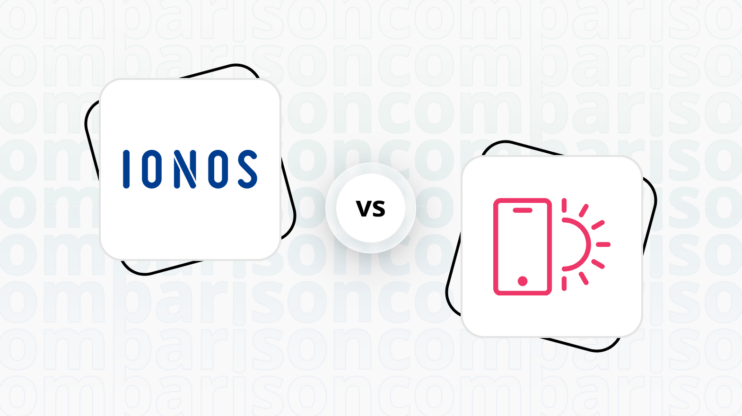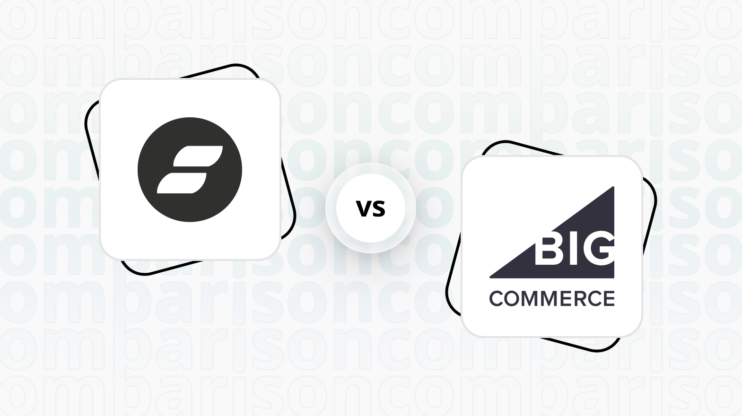Final verdict
Google Sites and SmugMug cater to distinct audiences with their unique sets of features and functionalities.
-
Google Sites (Overall Grade: 5.6/10)
is best suited for users looking for a straightforward, no-cost solution to create and collaborate on simple websites. It shines with its seamless Google Workspace integration, making it an ideal choice for educational projects, team collaborations, and personal portfolios. Despite its limitations in design customization and lack of native ecommerce features, Google Sites offers a reliable, user-friendly platform for those needing basic website functionality without the frills. -
SmugMug (Overall Grade: 6.3/10)
, on the other hand, is tailored for photographers and creatives who require a robust platform to showcase and sell their work. With its focus on high-quality image display, extensive customization options, and strong ecommerce capabilities, SmugMug stands out as the go-to choice for professionals looking to build a visually compelling online presence. While it may come at a higher cost, the platform’s specialized features justify the investment for those prioritizing photography and creative content.

|

|
|
|---|---|---|
|
Design functionalities & templates |
4.9 |
7.1 |
|
Ease of use |
8.3 |
7.8 |
|
Ecommerce |
1.8 |
7.3 |
|
Website Editors |
7.0 |
7.3 |
|
Product testing options |
6.9 |
7.4 |
|
Price |
8.1 |
7.8 |
|
Hosting quality |
8.2 |
5.0 |
|
Website speed optimization |
3.3 |
5.5 |
|
Plugins and integrations |
6.4 |
6.2 |
|
Marketing features |
2.6 |
3.8 |
|
Customer support |
7.2 |
7.9 |
|
Security |
9.3 |
6.0 |
|
User Management |
7.8 |
7.2 |
| Overall |
5.6 |
6.3 |
Best for ecommerce
 1.8
1.8
 7.3
7.3
Verdict
: For users looking to sell online, especially photographers and creatives, SmugMug is the superior choice with its dedicated ecommerce features. Google Sites, while useful for basic website needs, falls short for ecommerce.
-
Google Sites
: Offers a basic platform that can be adapted for ecommerce with third-party tools, but lacks the integrated features necessary for a seamless online selling experience. -
SmugMug
: Specifically designed for selling photography and creative work online, SmugMug provides comprehensive ecommerce capabilities, including product pricing, tax handling, and support for multiple currencies, making it the go-to choice for creatives looking to monetize their work.
Best for informational & business websites
 7.2
7.2
 7.5
7.5
Verdict
: SmugMug slightly edges out Google Sites for informational business websites, particularly for those in creative fields like photography, despite Google Sites’ broader applicability and ease of use.
-
Google Sites
: Offers a straightforward, no-frills approach to website building, making it ideal for creating basic informational sites. Its integration with Google’s ecosystem and collaborative features are significant advantages for team projects and small businesses looking for simplicity and functionality. -
SmugMug
: Tailored for photographers and creatives, SmugMug shines with its superior design functionalities and templates optimized for visual content. It’s the better choice for businesses that need to showcase high-quality images and seek a platform with robust photo protection and e-commerce capabilities for selling work online.
Detailed comparison
Design functionalities & templates
Design FunctionalitiesRepresents how well each platform allows for creative design and customization of websites.Score Components:
- Template Variety (30%): Range and quality of design templates.
- Customization (30%): Flexibility and options for design alterations.
- User Interface (20%): Ease and intuitiveness of the design process.
- Responsiveness (10%): Adaptability to different devices and screen sizes.
- Innovation (10%): Unique design features and tools.
 4.9
4.9
 7.1
7.1
🏆
Winner: SmugMug.
If you’re a photographer or a creative looking for a platform that offers a range of customizable, easy-to-use templates optimized for displaying high-quality images, SmugMug is the preferred choice.
Google Sites offers a limited number of templates suitable for various purposes, from personal blogs to business websites. These templates are designed for user engagement, simplicity, and functionality, allowing for customization to meet specific needs. However, compared to other website builders, Google Sites might offer less variety in templates and design customization options.
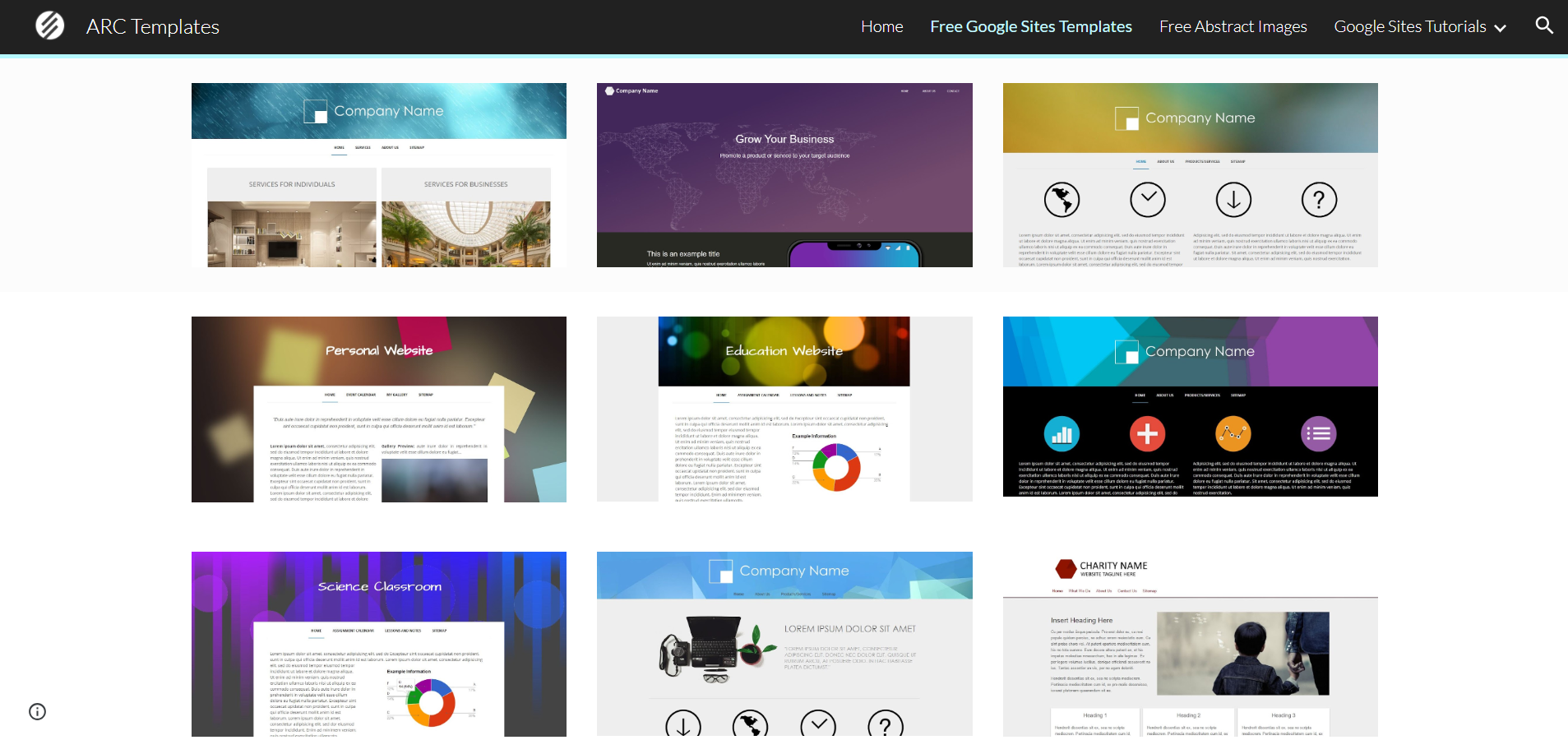

On the other hand, SmugMug offers a variety of templates and designs, catering to the diverse needs of photographers and visual artists. Users can choose from an extensive collection of customizable templates, ensuring their website or portfolio reflects their unique style and brand. The platform continuously updates its design offerings, incorporating the latest trends and user feedback, to provide a rich selection of modern, sleek, and professional layouts.
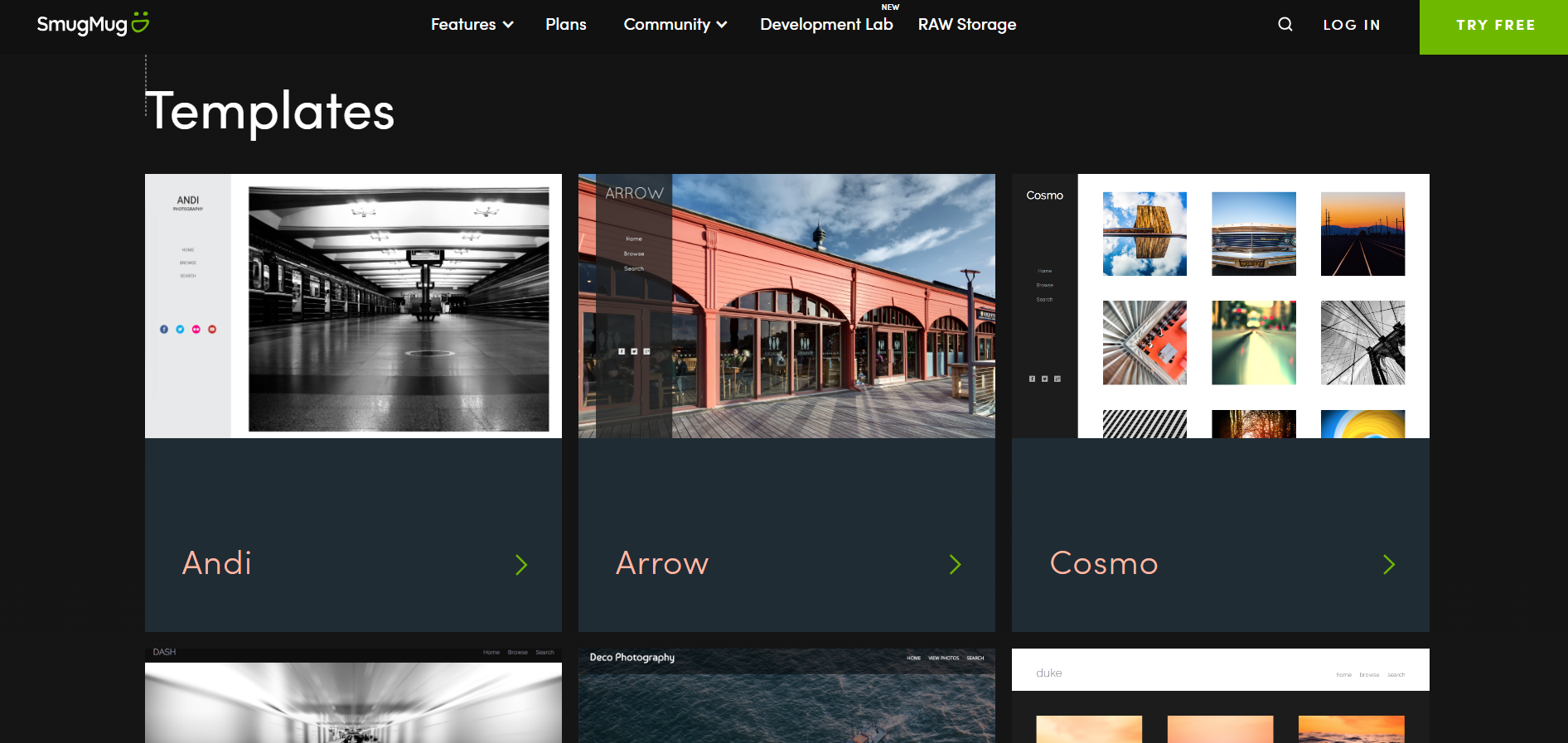

Get a head start on website creation with AI
Create a custom website tailored to your business needs 10X faster with 10Web AI Website Builder!
Ease of use
Ease of useReflects the platform’s overall user-friendliness.Score
Components:
- Learning curve (40%): Quickness and ease of getting started.
- Interface design (30%): Simplicity and intuitiveness of layout.
- User guidance (20%): Quality of tutorials and support.
- Flexibility (10%): Adaptability to various user skills.
 8.3
8.3
 7.8
7.8
🏆 Winner: Google Sites
. Scoring 8.3, Google Sites offers a user-friendly interface that allows individuals with no coding experience to create and publish websites easily. SmugMug, with a score of 7.8, also offers a user-friendly interface but is specifically designed for photographers and creatives, which may limit its versatility for other types of websites.
Learning Resources
🏆 Winner: Google Sites
. Google Sites offers a wide array of learning resources, from practical guides for educators to comprehensive digital skill development programs for the wider public. SmugMug also provides learning materials and features, including beginner’s guides and a wide array of tutorials on YouTube created by content creators.
For ecommerce
EcommerceMeasures the platform’s effectiveness in supporting online business activities.Score Components:
- Ecommerce themes and templates (20%): Variety and design of templates.
- Product management (25%): Ease of managing and organizing products.
- Payment options (25%): Variety and convenience of payment methods.
- Ecommerce features (20%): Features for managing an ecommerce store.
- Integration (10%): Compatibility with external e-commerce tools and services.
 1.8
1.8
 7.3
7.3
When it comes to ecommerce, SmugMug and Google Sites cater to different needs. SmugMug is designed for photographers and creatives who want to sell their work online, offering robust ecommerce capabilities. Google Sites, on the other hand, is a simple website builder that doesn’t have built-in ecommerce features but allows for the integration of third-party tools and widgets for ecommerce functionality.

|

|
|
|---|---|---|
|
Ecommerce themes and templates |
0.0 |
8.0 |
|
Product page customization |
0.0 |
6.5 |
|
Payment processing and commissions |
1.0 |
6.0 |
|
POS capabilities |
0.0 |
0.0 |
|
Payment gateways |
2.0 |
5.0 |
|
Product numbers |
0.0 |
9.0 |
|
Additional ecommerce features |
0.5 |
6.5 |
Google Sites ecommerce features:
Google Sites itself does not have built-in ecommerce features. However, you can integrate ecommerce functionalities into a Google Sites website by embedding third-party tools or widgets, linking to an external ecommerce platform, or using buttons that link to payment processors. For instance, you could use Google Forms for order forms and integrate PayPal or another payment service for transactions. To have a full-fledged ecommerce platform with Google Sites, you’d need to rely on these external integrations or services.
SmugMug ecommerce features:
- Digital Downloads
- Product Pricing
- Tax handling
- Discounts and Coupons
- Multiple Currencies support
Ecommerce themes & templates
Google Sites does not have any ecommerce templates. On the other hand, almost all of the templates of SmugMug are designed with ecommerce in mind, providing built-in shopping cart functionality.
Product page customization
Google Sites lacks any product page customization features, as the products can be listed with embedding third-party platforms, all the customization can be done within the mentioned platforms. SmugMug, on the other hand, prioritizes photography, offering a platform tailored for photographers to showcase and sell their work. Despite having more limited product page customization compared to dedicated e-commerce platforms, it still provides enough functionality to detail digital and printed photography products effectively, enabling users to sell online with ease.
Payment processing
You can integrate payment gateways into Google Sites using external tools or links, not through native features. This can be done by embedding HTML code for payment buttons from services like PayPal, Square, or Stripe, or by linking to an external checkout page. Third-party eCommerce widgets also offer a way to add payment functionalities. However, Google Sites doesn’t offer the comprehensive eCommerce capabilities that dedicated platforms provide.
SmugMug has a unique approach to payment processing. Payment processing for your sales is managed through your account settings, where you must complete a Tax & Payment form to set up your payment preferences. You can choose your profit payment schedule, with automatic monthly payments for balances over $500, or request payments for lower amounts. Your earnings are calculated as 85% of the markup on print prices or download sales, with SmugMug retaining 15% to cover various costs. Payments are made via ACH direct deposit for U.S. users or PayPal for international users, processed on the first business day after the 7th of each month for profits accumulated through the end of the previous month.
Website Editors
Website EditorsEvaluates the platforms’ website building and editing capabilities.Score Components:
- Customization tools (40%): Range and power of editing features.
- Editor usability (30%): User experience within the editor.
- Design flexibility (20%): Freedom in layout and design changes.
- Update and maintenance ease (10%): Simplicity of updating and maintaining the site.
 7.0
7.0
 7.3
7.3
🏆
Winner: SmugMug
. SmugMug, with a score of 7.3, offers a user-friendly interface that allows for the creation of visually appealing, professional-grade photography websites without the need for coding knowledge. Users can customize their site by choosing from a variety of templates, adjusting layouts, and incorporating their own branding elements like logos and colors. The editor also supports easy uploading, organizing, and showcasing of high-quality images, with robust privacy and security settings to protect content. Additionally, SmugMug provides tools for selling prints and digital downloads directly from the website, making it a comprehensive platform for photographers looking to display and monetize their work online.
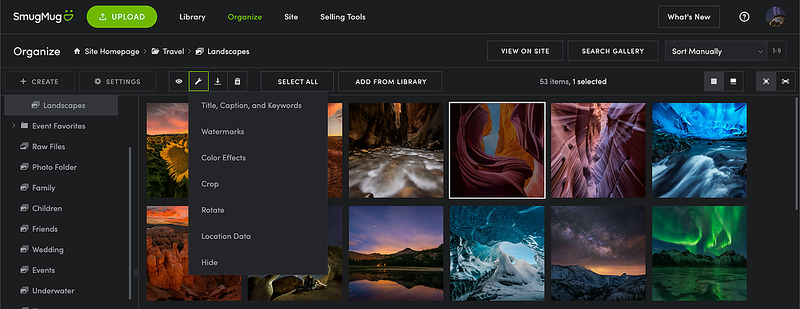
Google Sites’ editor, scoring 7.0, offers a user-friendly website builder editor that allows users to create and design websites without needing coding knowledge. With its drag-and-drop interface, users can easily add, customize, and arrange elements such as text, images, and videos on their web pages. It also provides a variety of templates and design options to help users get started quickly and ensure their site looks professional. Additionally, Google Sites integrates seamlessly with other Google services, enabling the incorporation of Google Docs, Sheets, Slides, and Maps directly into the website.

Mobile editor/app
 0
0
 7.5
7.5
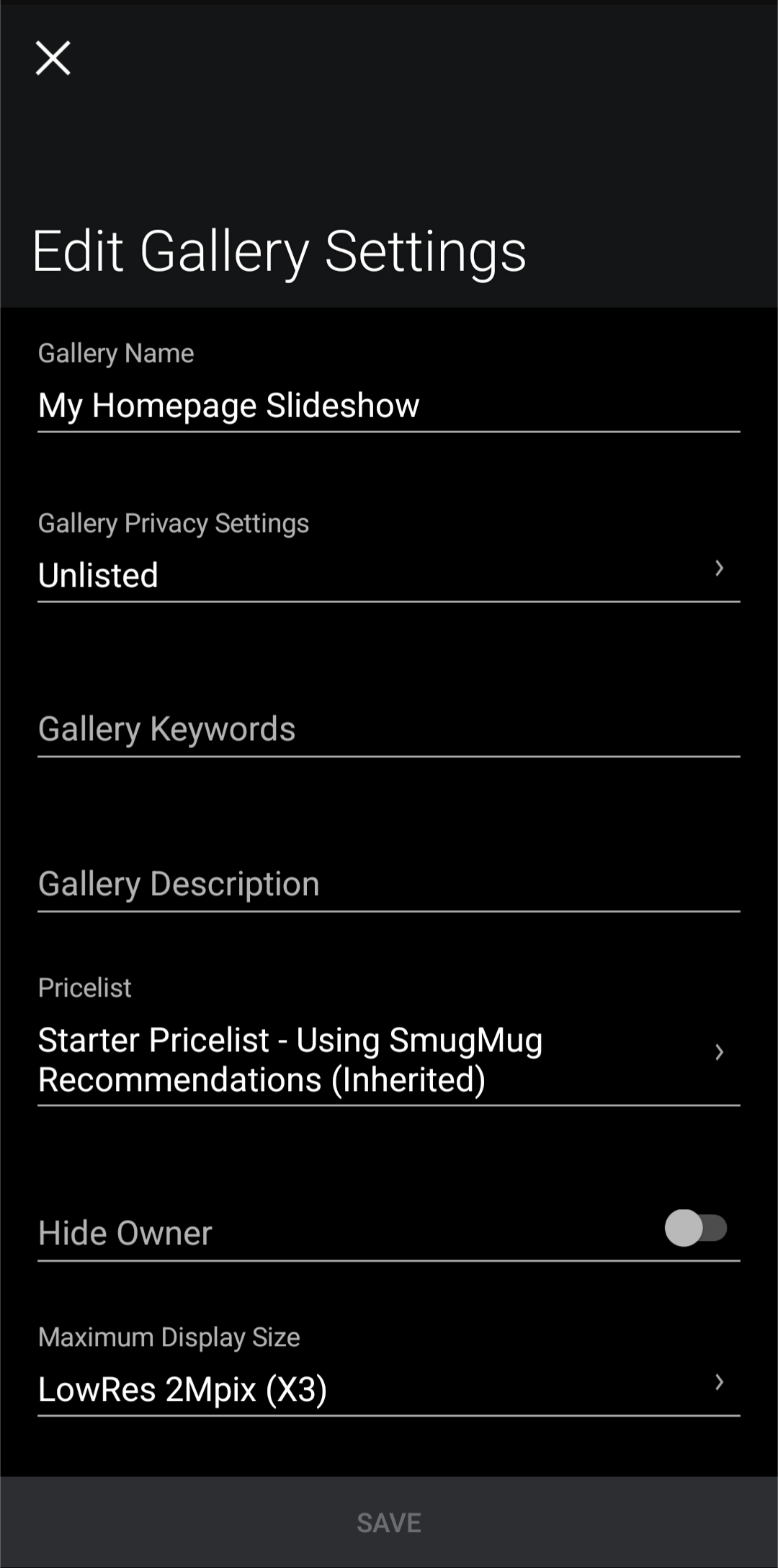
🏆
Winner: SmugMug
. Google Sites does not offer a mobile editor app, which means users cannot edit their websites on mobile devices. On the other hand, SmugMug does offer a mobile editing app, but its functionality is limited to adding new photos and editing descriptions. Despite its limitations, SmugMug’s mobile app still provides more functionality than Google Sites, which does not offer a mobile editing app at all. Therefore, SmugMug is the clear winner in this category.
Product testing options
Product Testing OptionsAssesses the options for trying out platform features before commitment.Score Components:
- Trial quality (40%): Extent and usefulness of the trial or free version.
- Feature accessibility (30%): How many features are available to test.
- Trial duration (20%): Length of the trial period.
- Ease of transition (10%): Smoothness of moving from trial to paid plans.
 6.9
6.9
 7.4
7.4
Overall Result
:
SmugMug Wins
. SmugMug scores 7.4, slightly higher than Google Sites’ 6.9. Both Google Sites and SmugMug offer a 14-day free trial, but only SmugMug allows testing of premium features during the trial. Google Sites does offer a free version, but it does not provide a money-back guarantee.

|

|
|
|---|---|---|
|
Free Plan |
Yes | No |
|
Trial Duration |
14 days | 14 days |
|
Testing Premium Features |
Some features during free trial |
All features during free trial |
|
Money Back Guarantee |
No | No |
Price
PriceLooks at the cost-effectiveness and value for money of each platform.Score Components:
- Plan value (40%): What each pricing tier offers.
- Transparency and clarity (30%): Clearness of pricing structures.
- Flexibility of plans (20%): Range of options to suit different budgets.
- Hidden costs (10%): Additional expenses not included in the plan.
 8.1
8.1
 7.8
7.8
Google Sites offers a more affordable pricing structure, while SmugMug provides more specialized features for photographers and creatives.

|

|
|
|---|---|---|
|
$0-$10 |
Business Starter ($7.20/month): This plan includes basic features suitable for individuals or small businesses, offering professional email through Gmail, 30GB of storage per user, and video meetings for up to 100 participants. It allows to manage 1 website and there is no limitation on number of pages. Value for price: 6.0 |
No offering at this amount. |
|
$10-$20 |
Business Standard ($14.40/month): Suitable for growing businesses, this plan provides 2 TB of storage per user, video meeting capacity for up to 150 participants with recording features, and access to smart booking pages and shared drives. It allows to manage 1 website and there is no limitation on number of pages. Value for price: 7.5 |
Power ($15.00/month): Best for the photographer who wants their entire photo catalog safe and shareable on their own terms. Unlimited storage, Seamless Lightroom integration Value for price: 6.5 |
|
$20-$40 |
Business Plus ($21.60/month): Designed for larger businesses needing more robust capabilities, offering 5 TB of storage per user, advanced security options, and video meetings for up to 500 participants. It allows to manage 1 website and there is no limitation on number of pages. Value for price: 8.5 |
Portfolio ($31.00/month): Best for the photographer who wants to start selling photos and keep their archive organized perfectly. All Power plan’s features, plus 21 premade templates, prints and digital downloads sales, Custom Watermarks, Payment integration for credit cards and PayPal, Integrated cart and checkout experience, Sales statistics. Value for price: 8.0 |
|
$40-$50 |
No offering at this amount. |
Pro ($45.00/month): Adds to Portfolio with custom price lists and coupons, Platform access for assistant or second shooter, Full control over client downloads, Branded packaging and thank you notes for print sales, coupon creator. Value for price: 8.5 |
|
$500+ |
No offering at this amount. |
Venture (Starts with $500/month): All Pro features, plus dedicated support contacts and account representative for all Smugmug needs, Design, workflow, and organization consultation and support. Value for price: 9.0 |
location. As a result in rare cases the prices displayed here can differ from the ones you see on their
websites.
Hosting quality
Hosting
qualityExamines the reliability and performance of the hosting solutions.Score Components:
- Uptime (40%): Consistency and reliability of website availability.
- Speed (30%): Loading times and performance.
- Bandwidth and storage (20%): Sufficiency of resources provided.
- Data centers (10%): Quality and distribution of hosting infrastructure.
 8.2
8.2
 5.0
5.0
🏆
Winner: Google Sites
Google Sites offers cloud-based managed hosting with a 99.9% uptime guarantee and a network of 21 global data centers. It’s a reliable choice for team projects, personal portfolios, and small business websites. SmugMug, while it does offer hosting, lacks transparency about its hosting features, uptime, and data centers, making it difficult to assess its reliability.

|

|
|
|---|---|---|
|
Do they offer hosting? |
Yes, included in all plans |
Yes, included in all plans |
|
Data Centers: |
Google operates a total of 21 data centers across the globe: 2 in Asia, 5 in Europe, 13 in US and 1 in South America |
SmugMug does not provide any information about their data centers |
|
Type of hosting: |
Cloud based managed hosting |
SmugMug does not provide any information about their hosting types |
|
Uptime: |
99.9% |
SmugMug does not provide any information on their uptime statistics |
|
Uptime Guarantee: |
Yes, 99.9% |
Yes, 99.9% |
Website Speed Optimization
Website Speed OptimizationEvaluates optimization of website loading timesScore Components:
- PageSpeed Score (30%): Google’s score indicating performance optimization.
- Loading Time (30%): The average time until a website is fully interactive.
- Mobile Optimization (15%): Optimization effectiveness for mobile devices.
- Resource Optimization (15%): Optimizing images, scripts, and other heavy resources.
- CDN Usage (10%): Use of CDN to enhance speed across geolocations.
 3.3
3.3
 5.5
5.5
🏆 Winner: Google Sites
Both Google Sites and SmugMug prioritize website performance and page speed, but Google Sites takes the lead with a more comprehensive approach to speed optimization.

|

|
|
|---|---|---|
|
Focus |
Automated Optimization, CDN, Mobile Optimization, Browser Caching, Code Minification, Use of AMP |
Mobile Responsive design |
|
Performance Tools |
Google Lighthouse, PageSpeed Insights |
Google PageSpeed Insights Integration |
|
Key Strategies |
Automated Optimization, CDN, Mobile Optimization, Browser Caching, Code Minification, Use of AMP |
Mobile Responsive design |
|
Load Times |
Google does not disclose statistics about website Page Speed scores, or load times |
Both load times and Page speed scores varies widely, depending on the optimization, website complexity |
|
Page Speed Scores Range |
Google does not disclose statistics about website Page Speed scores, or load times |
Both load times and Page speed scores varies widely, depending on the optimization, website complexity |
|
Core Web Vitals Improvement |
Emphasis on LCP, FID, CLS improvements |
Smugmug does not share any information on CWV improvements |
Google Sites uses a comprehensive approach to speed optimization, including automated optimization, CDN, mobile optimization, browser caching, code minification, and the use of AMP. However, Google does not disclose statistics about website Page Speed scores or load times. Google Sites also emphasizes on LCP, FID, CLS improvements for Core Web Vital improvements.
On the other hand, SmugMug uses mobile responsive design for speed optimization. However, both load times and Page speed scores vary widely, depending on the optimization and website complexity. SmugMug does not share any information on CWV improvements.
Get a head start on website creation with AI
Create a custom website tailored to your business needs 10X faster with 10Web AI Website Builder!
Plugins and integrations
Plugins and integrationsMeasures the range and effectiveness of additional plugins and integrations.Score Components:
- Variety of options (40%): Range of available add-ons.
- Integration smoothness (30%): Ease of integrating plugins into the site.
- Quality of plugins (20%): Functionality and reliability of the options.
- Custom integration capabilities (10%): Support for custom or third-party integrations.
 6.4
6.4
 6.2
6.2
🏆 Winner: Google Sites.
Google Sites scores 6.4, slightly ahead of SmugMug’s 6.2. Google Sites offers a wide array of plugins and extensions to enhance website functionality, catering to various needs such as social media integration, e-commerce, chats, forms, video, audio, and more. On the other hand, SmugMug supports integrations with several photo-hosting services, enhancing its functionality for photographers. These integrations include Dropbox, Adobe Lightroom, Google Photos, Flickr, and Amazon Drive. This capability allows for efficient and easy importation of photos directly from these services to SmugMug, bypassing the need to first sort through or store photos on a computer. However, Google Sites’ broader range of plugins and extensions gives it the edge in this comparison.

Marketing Features
Design FunctionalitiesRepresents how well each platform allows for creative design and customization of websites.Score Components:
- Template Variety (30%): Range and quality of design templates.
- Customization (30%): Flexibility and options for design alterations.
- User Interface (20%): Ease and intuitiveness of the design process.
- Responsiveness (10%): Adaptability to different devices and screen sizes.
- Innovation (10%): Unique design features and tools.
 2.6
2.6
 3.8
3.8
🏆
Overall Winner: SmugMug
. SmugMug edges out Google Sites with a slightly higher score, offering basic SEO tools, social media integration, and analytics and reporting. Google Sites, while offering similar features, falls short in its lack of email marketing and blogging capabilities.

|

|
|
|---|---|---|
|
SEO Tools |
Basic SEO settings |
Basic SEO settings |
|
Email Marketing |
No |
No |
|
Blogging |
No |
No |
|
Social Media Integration |
Yes, you can easily embed social media links and widgets |
Yes, allows sharing work directly on social platforms |
|
Analytics and Reporting |
Yes, Google Analytics integration |
Yes, possibility to integrate Google Analytics |
|
Ads and Promotions |
No |
No |
Customer Support
Customer supportEvaluates the quality and availability of support options.Score Components:
- Response time (40%): Speed of support responses.
- Support quality (30%): Effectiveness and helpfulness of the support.
- Availability (20%): Range of support channels (phone, chat, email).
- Resource richness (10%): Quality of self-help and educational materials.
 7.2
7.2
 7.9
7.9
🏆 Winner: SmugMug
. With a customer support score of 7.9, SmugMug edges out Google Sites in this category. SmugMug provides customer support mainly through email and chat, available 364 days a year, with rapid response times. Users can contact support by submitting a form via the “Contact Us” button on any page of their help center. Additionally, chat support offers an immediate response option through their help portal. While these support options are widely accessible, phone support is available exclusively for users with a higher-tier business subscription.
Google Sites offers customer support primarily through self-service resources like a Help Center and community forums, accessible to all users. Direct support, including phone, email, and live chat, is available to Google Workspace customers, with the level of support varying by subscription tier. Google Workspace provides 24/7 support for critical issues to eligible customers, with support availability and response times depending on the user’s specific plan. Free users of Google Sites have access to self-help resources, while paid Google Workspace subscribers benefit from more comprehensive direct support options.
Security
SecurityLooks at the platforms’ security measures and data protection.Score Components:
- Data protection (40%): Safeguards for user and customer data.
- SSL and encryption (30%): Implementation of secure connections.
- Compliance (20%): Adherence to industry security standards.
- Regular updates (10%): Frequency of security updates and patches.
 9.3
9.3
 6.0
6.0
🏆
Winner: Google Sites
. Google Sites, with a security score of 9.3, offers robust security measures including SSL encryption, two-factor authentication, and automatic malware scanning. It also benefits from Google’s regular security updates and compliance with international data protection standards. Google Sites’ infrastructure provides DDoS protection and data redundancy, ensuring site accessibility even under heavy traffic.
SmugMug, scoring 6.0 in security, takes privacy and security seriously, implementing strict privacy settings and controls. However, it does not disclose detailed information about its website security measures, apart from the ability to protect website content with passwords and hide account owner information.
AI Capabilities
AI capabilitiesMeasures the effectiveness of AI-driven features and tools.Score Components:
- Automation efficiency (40%): Impact of AI on streamlining processes.
- Personalization (30%): AI-driven customization for users or customers.
- AI-Assisted design (20%): Role of AI in website design and functionality.
- Data analysis (10%): Use of AI in interpreting user data and analytics.
 0
0
 0
0

|

|
|
|---|---|---|
|
Personalized Design |
|
|
|
SEO Optimization |
|
|
|
Customer Behavior Analysis |
|
|
|
Sales Predictions |
|
|
|
Inventory Management |
|
|
|
Content Generation |
|
|
🏆 Winner: None
. Neither Google Sites nor SmugMug offer AI capabilities. Both builders focus on providing a straightforward, user-friendly interface for building websites. While Google Sites is integrated with Google Workspace and SmugMug is designed specifically for photographers, neither platform utilizes AI for personalized design, SEO optimization, customer behavior analysis, sales predictions, inventory management, or content generation.
User Management
User ManagementAssesses the platforms’ capabilities in managing user roles, permissions, and accessibility.Score Components:
- Role Customization (40%): Flexibility in creating and defining user roles and
permissions. - Ease of Management (30%): User interface and tools for managing users.
- Access Control (20%): Effectiveness of access control measures for different user
levels. - Scalability (10%): Ability to manage a growing number of users efficiently.
 7.8
7.8
 7.2
7.2
🏆 Winner: Google Sites
. Both Google Sites and SmugMug offer collaborative features, but Google Sites provides a more flexible approach to user management.
- Google Sites allows multiple users to collaborate with different roles, including Owners, who have full control, and Editors, who can modify content but not site settings. There’s no strict limit on the number of users who can edit a site, allowing flexibility in management and development. Viewers can only see the site, with no editing permissions. This structure supports collaborative website building with varied levels of access and control for different users.
- SmugMug allows the primary account holder full control over the account, with the ability to add additional users through “Shared Account Management” for Portfolio and Pro level accounts. These additional users can be given various roles with different permissions, enabling them to manage or edit the website without full access to billing or account settings. The number of users and the extent of their permissions depend on SmugMug’s current offerings.
SmugMug User Roles and Access Levels:
| Role | Description | Access Highlights |
|---|---|---|
| Owner | The primary account holder who has full control over the site. | Complete access to all features, settings, content management, and billing. |
| Admin | Users granted almost the same level of access as the owner, minus some critical billing or account settings. | Manage content, order prints, access to stats, and settings except for account and billing changes. |
| Contributor | Users who can upload and manage content in specific galleries. | Upload content to assigned galleries, edit captions, and keywords. Limited access to settings. |
Additional Features

|

|
|
|---|---|---|
|
SSL Certificate |
|
|
|
Custom Domain |
|
|
|
Free Custom Domain Included |
|
|
|
International Domains |
|
|
|
Mobile Responsive |
|
|
|
Page Speed |
|
|
|
Website Builder Mobile App |
|
|
|
Convert a Website To An App |
|
|
|
Website Analytics |
|
|
|
Multilingual Sites |
|
|
|
Multiple Users |
|
|
User Feedback
Google Sites is highly praised by users for its seamless integration, ease of use, and collaborative features. It is a popular choice for various professional and educational needs due to its simplicity and user-friendly interface. While some users desire more customization options and additional features, Google Sites remains highly valued for its versatility and streamlined workflow facilitation.
SmugMug, on the other hand, is appreciated for its reliability, ease of use, and the platform’s ability to securely host and share high-resolution photographs and videos. Users highlight its seamless mobile device syncing, excellent gallery features, and robust customization options. However, some users desire improvements in facial recognition technology, expanded asset management capabilities, and more advanced search functionalities. Despite concerns about rising costs and the platform’s intuitiveness, SmugMug is valued for its central storage solution, privacy features for client photos, and its ability to simplify file sharing and photo sales.
The making of this blog
We followed a clear, step-by-step process to write and research this article.
FAQ
Which platform is better for photographers, Google Sites or SmugMug?
Can I use Google Sites for an ecommerce project?
How do Google Sites and SmugMug compare in terms of ease of use?
Which platform offers better templates for creative content?
Is Google Sites a good option for team projects and collaboration?
What are the main differences in pricing between Google Sites and SmugMug?
Which platform provides better customer support?
How do the security features of Google Sites and SmugMug compare?










